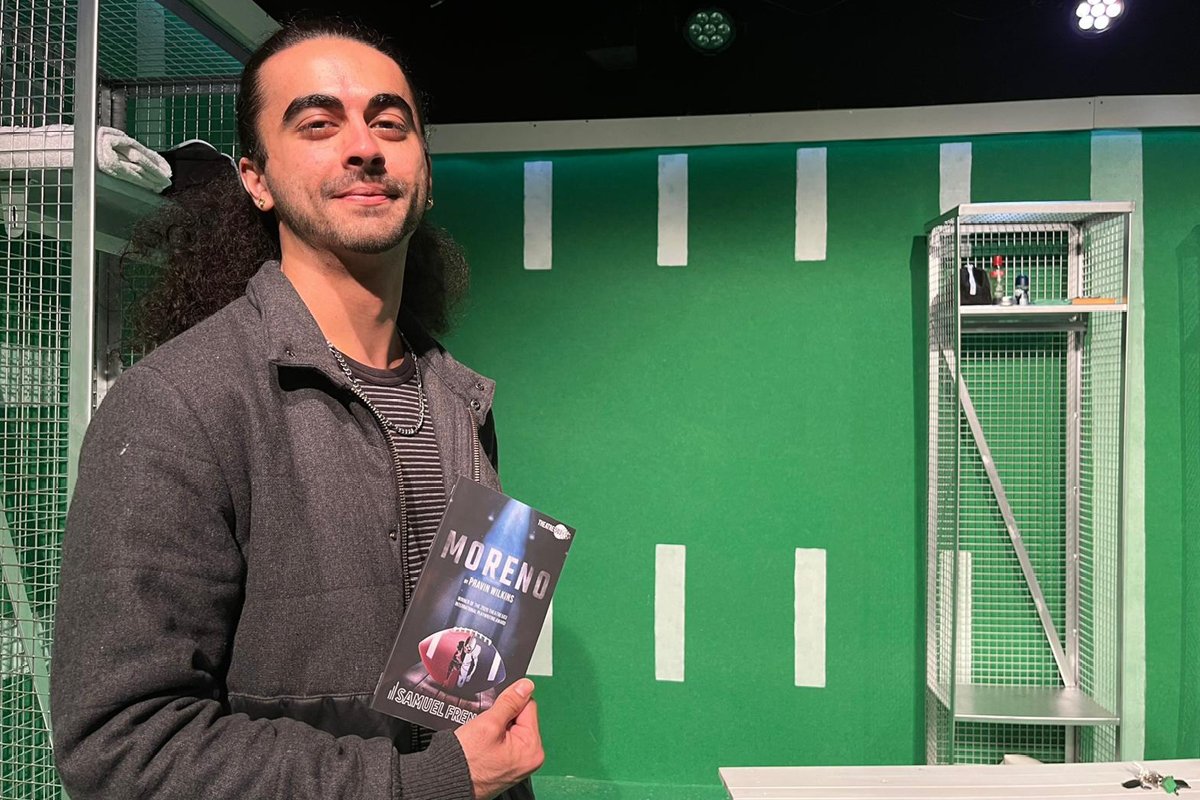
Pravin Wilkins is a playwright, poet and fiction writer based in Pittsburgh, Pennsylvania whose works typically deal with race and class struggle – and the many intersections between. His play Moreno won the 2020 Theatre503 International Playwriting Award, of which Concord Theatricals is a proud sponsor, and received a full production in London 2022. We caught up with Pravin about the creative inspiration behind the play, putting the world of sports on stage, and his advice for emerging writers.
Firstly, can you talk about Moreno (US/UK) and where the idea for the play came from?
I grew up watching American football and played for my high school team, so I have always followed the NFL very closely. In 2016, when Kaepernick started sitting – and then taking a knee – during pre-game performances of the national anthem, it became a big point of discussion among my friends and former teammates. I personally felt inspired by Kaepernick’s action, and at the time hoped that continued substantive actions for racial justice would ensue. As it turned out, Kaepernick’s action did inspire hundreds of players across the league to join him in protest, to reanalyze and reconsider their own contributions to political movements and struggles for equity. However, the media coverage of and public discourse around these events was consistently myopic, opinion-based and overly emotional – seemingly always centering the viewer, the observer, the critic.
With Moreno, I wanted to tell a story that centered the players at the heart of these explosive events, which explored their personal connections and reasons for joining or not joining the movement.
How did you go about creating the world of American football for a theatre stage?
Since the play centers four fictional NFL players, I wanted the main settings to be spaces where they would specifically be interacting with each other and no one else. I chose the locker room as the primary setting because it is a space where men speak plainly with one another, where they oscillate from ridiculous jokes to serious conversations in a matter of seconds. “Locker room talk” is indeed so much more than former president Donald Trump suggested it was when he invoked that phrase as a defense of his words in the infamous Access Hollywood tape; Moreno brings us to a locker room where people speak in a way that more so resembles what I experienced as an athlete. While costumes, set, sound and movement are clearly crucial in making the world of American football feel genuine on stage, the creation of this environment begins with the attitudes of and interactions between the characters.
Moreno asks some challenging questions about race, masculinity and class. What is it about the specific form of theatre, do you think, that lends itself to exploring these important social issues?
Theatre is a particularly beautiful medium for the exploration of social issues because it literally brings people together, all in one room, for a collective experience. Intermissions give audiences a chance to discuss what they’ve seen – then, when the lights go out at the end, everybody exits to the same lobby and people have the opportunity to grapple with difficult themes amongst others who are doing the same. Audience members have a chance to strike up conversations with friends as well as strangers about their views and what they’ve taken from the piece (or at the very least, one might overhear an interesting perspective brought up by someone nearby). There is a spiritual element to a worthwhile theatre performance, the way it demands that we step outside of ourselves while simultaneously looking inward.
What advice would you have for companies looking to stage the show in the future?
The dialogue should have a strong rhythm to it; this is really the heart of the play. Also, as the dialogue in the play is hyper-realistic, the set should not have to be. The movement sections, as well as transitions, are moments to explore the internal space that the characters keep guarded underneath their bravado and wit. Since the characters in Moreno never speak directly to the audience, it is important we get that window into what’s going on inside their heads in other ways.
What impact has the Theatre503 International Playwriting Award had on your writing?
In terms of my career, the award has definitely launched me many steps forward. When I came to London for the show, I made so many connections with theatremakers, agents and artists. What’s more, the award was the basis for my relationship with Concord Theatricals, which of course publishes and licenses the play. As a writer, this is one of the most important achievements one can reach. The monetary side of the award also freed me up to actually get started in earnest on new plays, which has been something I had struggled to do since graduating from Carnegie Mellon in 2020 (finding time for writing can be difficult when working 40-50 hour weeks).
What one piece of advice would you share with aspiring playwrights?
Submit your plays everywhere you can. Then, when you are putting up one of your plays, listen to your director, your actors and your team. This does not mean you should always defer to the suggestions or perspectives of others, but rather that you should strongly consider their input and never dismiss anyone. The best way to elevate your work is to open yourself up to the collaborative element of theatre; a work of art that is meant to hold a multitude of voices must be pieced together in a way that reflects the final product.
The script for Moreno is now available to buy (US/UK). You may also register your interest to perform the play in the future (US/UK).
Tap or click to learn more about the Theatre503 International Playwriting Award, of which Concord Theatricals is a proud sponsor.

Newly Available for Licensing – January 2026 (US)

Comedy Mysteries: Gasps, Laughs and Thrills

